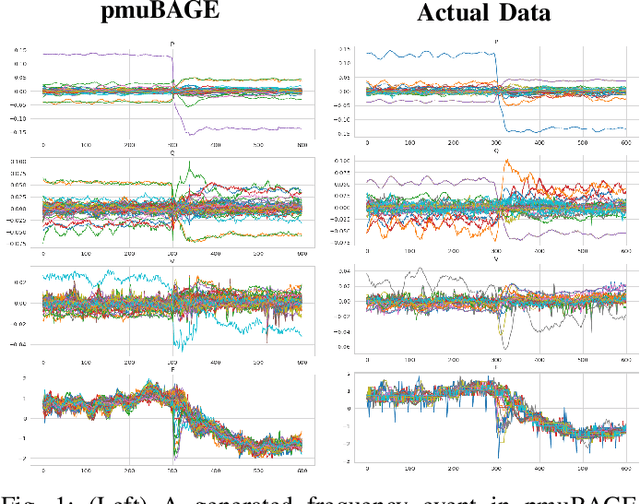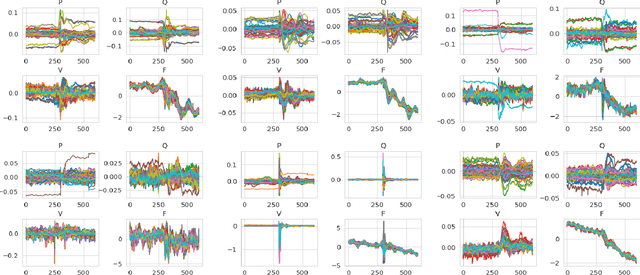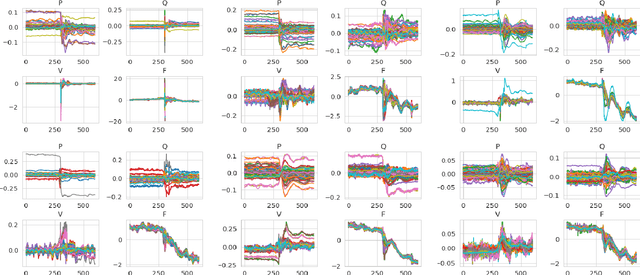Koji Yamashita
Adversarial Purification for Data-Driven Power System Event Classifiers with Diffusion Models
Nov 13, 2023Abstract:The global deployment of the phasor measurement units (PMUs) enables real-time monitoring of the power system, which has stimulated considerable research into machine learning-based models for event detection and classification. However, recent studies reveal that machine learning-based methods are vulnerable to adversarial attacks, which can fool the event classifiers by adding small perturbations to the raw PMU data. To mitigate the threats posed by adversarial attacks, research on defense strategies is urgently needed. This paper proposes an effective adversarial purification method based on the diffusion model to counter adversarial attacks on the machine learning-based power system event classifier. The proposed method includes two steps: injecting noise into the PMU data; and utilizing a pre-trained neural network to eliminate the added noise while simultaneously removing perturbations introduced by the adversarial attacks. The proposed adversarial purification method significantly increases the accuracy of the event classifier under adversarial attacks while satisfying the requirements of real-time operations. In addition, the theoretical analysis reveals that the proposed diffusion model-based adversarial purification method decreases the distance between the original and compromised PMU data, which reduces the impacts of adversarial attacks. The empirical results on a large-scale real-world PMU dataset validate the effectiveness and computational efficiency of the proposed adversarial purification method.
pmuBAGE: The Benchmarking Assortment of Generated PMU Data for Power System Events
Oct 25, 2022Abstract:This paper introduces pmuGE (phasor measurement unit Generator of Events), one of the first data-driven generative model for power system event data. We have trained this model on thousands of actual events and created a dataset denoted pmuBAGE (the Benchmarking Assortment of Generated PMU Events). The dataset consists of almost 1000 instances of labeled event data to encourage benchmark evaluations on phasor measurement unit (PMU) data analytics. PMU data are challenging to obtain, especially those covering event periods. Nevertheless, power system problems have recently seen phenomenal advancements via data-driven machine learning solutions. A highly accessible standard benchmarking dataset would enable a drastic acceleration of the development of successful machine learning techniques in this field. We propose a novel learning method based on the Event Participation Decomposition of Power System Events, which makes it possible to learn a generative model of PMU data during system anomalies. The model can create highly realistic event data without compromising the differential privacy of the PMUs used to train it. The dataset is available online for any researcher or practitioner to use at the pmuBAGE Github Repository: https://github.com/NanpengYu/pmuBAGE.
pmuBAGE: The Benchmarking Assortment of Generated PMU Data for Power System Events -- Part I: Overview and Results
Apr 03, 2022



Abstract:We present pmuGE (phasor measurement unit Generator of Events), one of the first data-driven generative model for power system event data. We have trained this model on thousands of actual events and created a dataset denoted pmuBAGE (the Benchmarking Assortment of Generated PMU Events). The dataset consists of almost 1000 instances of labeled event data to encourage benchmark evaluations on phasor measurement unit (PMU) data analytics. The dataset is available online for use by any researcher or practitioner in the field. PMU data are challenging to obtain, especially those covering event periods. Nevertheless, power system problems have recently seen phenomenal advancements via data-driven machine learning solutions - solutions created by researchers who were fortunate enough to obtain such PMU data. A highly accessible standard benchmarking dataset would enable a drastic acceleration of the development of successful machine learning techniques in this field. We propose a novel learning method based on the Event Participation Decomposition of Power System Events, which makes it possible to learn a generative model of PMU data during system anomalies. The model can create highly realistic event data without compromising the differential privacy of the PMUs used to train it. The dataset is available online for any researcher to use at the pmuBAGE Github Repository - https://github.com/NanpengYu/pmuBAGE. Part I - This is part I of a two part paper. In part I, we describe a high level overview of pmuBAGE, its creation, and the experiments used to test it. Part II will discuss the exact models used in its generation in far more detail.
 Add to Chrome
Add to Chrome Add to Firefox
Add to Firefox Add to Edge
Add to Edge